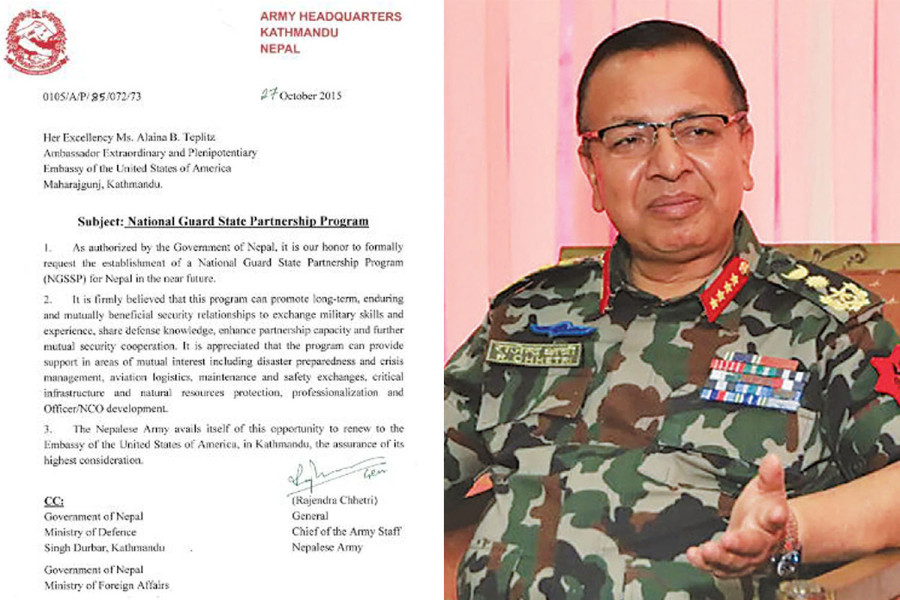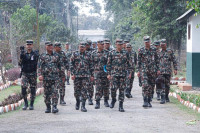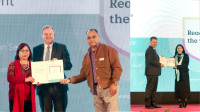National
On SPP, no party looks clean— all lying, playing to the gallery
A Nepal Army letter shows Nepal applied for the State Partnership Program in October 2015. While the national defence force finds itself in the dock, politicians are equally answerable.
Anil Giri & Binod Ghimire
A leaked Nepal Army letter to the United States has not only put the country’s national defence institution in the dock but also exposed Nepali politicians’ duplicity.
Amid politicians’ blame game over Nepal’s participation in the United States government’s State Partnership Program, an October 2015 letter sent by the Nepal Army to the then US ambassador to Kathmandu has made it to the public domain.
In the letter, undersigned by then Army chief Rajendra Chhetri, the Nepal Army has requested the establishment of the National Guard State Partnership Program for Nepal.
“As authorised by the government of Nepal, it is our honour to formally request the establishment of the National Guard State Partnership Program for Nepal,” reads the letter addressed to Alaina B Teplitz, then US ambassador to Nepal.
“It is firmly believed that this program can promote long-term, enduring and mutually beneficial security relationships to exchange military skills and experience, share defence knowledge, enhance partnership capacity and further mutual security cooperation.”
The letter was leaked a day after the Army refuted claims that Nepal is part of the State Partnership Program. It also comes as a vindication for the United States, as its embassy on Wednesday said that Washington accepted Nepal in the SPP in 2019 after two requests in 2015 and 2017.
The SPP debate got traction after the recent visit by Commanding General of US Army Pacific Charles A Flynn.
During his meetings with Prime Minister Sher Bahadur Deuba and Army chief General Prabhu Ram Sharma, Flynn raised the issue of Nepal’s participation in the SPP.
But a section of the media published a document calling it a draft agreement between the Nepal Army and Utah National Guard of the United States, prompting the American embassy to react.
On Tuesday, the embassy said “the document published by some online outlets purporting to be a military deal between the United States and Nepal is fake”.
“By policy, the United States does not ask countries to join the State Partnership Program and only responds to requests for consideration,” added the embassy.
Then on Wednesday, Manual P Micaller, charge d'Affaires at the US embassy in Kathmandu, told the media: “Nepal applied for the SPP in 2015 and again in 2017. The United States accepted Nepal’s application in 2019.”
By this time, the SPP had already become a hotly debated issue in Nepal’s political circle.
The CPN-UML jumped in the fray, calling any move by the current coalition led by the Nepali Congress to join the military alliance will push the country into a geopolitical conflict. It charged the current coalition with making Nepal a playground for geopolitical games.
While speaking in Parliament on Thursday afternoon, UML senior vice chair Ishwar Pokhrel alleged that Nepali Congress leaders had initially given a positive response to the US about the SPP and now they are shifting the blame on the UML after the issue ran into controversy.
He claimed that the governments led by [the late] Sushil Koirala and Deuba in 2015 and 2017, respectively, had positively responded to Washington about the SPP.
“Firstly in 2015 and then in 2017, an official proposal was sent from Nepal. Who was leading the government then? Who was the prime minister then?” Pokhrel said. “In 2015, Sushil Koirala was the prime minister and defence minister. In 2017, Deuba was the prime minister. Who was leading the defence ministry? Deuba knows very well.”
Pokhrel’s claim, however, fell flat after the Army letter got leaked.
When the Nepal Army wrote to the US seeking Nepal’s participation in the SPP, UML chair KP Sharma Oli was the prime minister. The letter was carbon-copied to the Defence Ministry of Nepal, which was overseen by Oli then.
The Nepal Army confirmed to the Post about the letter.
“The letter is official. It was written in the aftermath of the 2015 earthquake seeking logistical and training support to cope with the disaster,” said Brigadier General Narayan Silwal, spokesperson for the Nepal Army, in a brief interview. “The letter mentions the SPP because such support is provided only by the US National Guard.”
On Wednesday’s statement that said the Nepal Army had not signed any agreement, Silwal said: “We stand by the statement as there has been no agreement on the SPP. Nor will there be any in the future.”
Earlier on Thursday, CPN (Maoist Centre) chair Pushpa Kamal Dahal said that Nepal agreed to the SPP when Oli was prime minister in 2019. Dahal is a key coalition partner in the current Deuba government.
“As a leader of the coalition, I want to declare that there won’t be any military agreement. The prime minister has also expressed his commitment to this effect,” said Dahal, while addressing a party function. “Instead, the Oli government agreed to the SPP in 2019.”
What Dahal appears to have omitted is that he was part of the party that Oli led in 2019 when the latter was leading the government. At that time, Dahal co-chaired the Nepal Communist Party, which was formed after a merger between the UML and the Maoist Centre, with Oli.
While the letter exposes UML’s bid to wash its hands of the responsibility, it also lays bare Dahal’s duplicity, for a second time in a row in less than four months.
Dahal’s double-dealing over the Millennium Challenge Corporation compact was widely reported by the media. After vehemently protesting against the MCC, Dahal’s party voted for the US grant to ratify it from Parliament in February-end.
The Congress also does not get easily exonerated, though.
As the US embassy has claimed, Nepal made requests twice—in 2015 and 2017—for its participation in the SPP, sources told the Post that yet another letter was dispatched to the US in 2017.
The Nepal Army confirmed to the Post that after the 2015 letter, it followed up with yet another correspondence in 2017, when Dahal was prime minister until June before he was succeeded by Deuba.
On Wednesday, Deuba told his coalition partners that Nepal won’t sign any agreement [with any country] that could bring harm to Nepal.
Observers say if Nepal had already become part of the SPP, Deuba must have been in the know and that his statement was simply aimed at causing distraction from the raging controversy. Despite calls from lawmakers, including those from his own Congress party, Deuba has not offered any clarification in Parliament about the SPP.
As far as the SPP is concerned, a 2019 US document mentioned Nepal as a new entrant, along with Sri Lanka. Many wonder why none of the political parties reacted or protested then.
Concerns had first arisen in December 2018 after the then foreign minister Pradeep Gyawali visited Washington. The US State Department in a statement said that Nepal “is part of the IPS”, raising eyebrows in Kathmandu, leaving Gyawali scrambling to clarify.
“Nepal’s role in the Indo-Pacific region was discussed during the meeting with Mike Pompeo [then secretary of state] but they did not talk about the IPS with us,” Gyawali told a press conference in Kathmandu upon his return. “We rejected the US’s unilateral decision to include Nepal in the IPS. There was no such decision or suggestion provided to the Nepal Army for joining the SPP when we were in the government.”
According to Gyawali, after the first letter in 2015, a delegation visited the US that included representatives of the Nepal Army.
“We were surprised after the US side included Nepal in the SPP under the IPS. Then we decided to form a committee and that committee suggested that we should not be part of it. No decision was made in the Cabinet and we did not send any further request to the US till the time we were in government,” Gyawali told the Post on Thursday.
The Oli government fell in July last year.
In December 2019, US Assistant Secretary of Defence for Indo-Pacific Security Affairs Randall Schriver visited Kathmandu and held talks with then defence minister Pokhrel and senior Nepal Army officials and discussed Nepal's inclusion in the SPP.
Pokhrel and other senior officials responded positively about joining the SPP. A four-member committee headed by then foreign secretary Shanker Das Bairagi was formed, with members from the ministries of Home and Defence and representatives of the Nepal Army.
A senior official who was privy to the development but is now retired told the Post that since there was no official communication from the US side, the Nepali side also did not object to the US report.
“Had we protested against the US report, there would have been no confusion that we are seeing today. The report had two things—one Nepal’s participation in the SPP, and second the SPP was made a part of the Indo-Pacific Strategy,” said the official who spoke on the condition of anonymity.
“Some discussions were held at that time whether to dismiss the report… but it was let go. We did not know the exact reason why such an objection was not communicated to the US side.”
A former secretary said the US side had informed Nepal that they had very little in funds… around $1 million to cooperate under the SPP at that time.
“At that time there was little talk about the IPS and its implications, as it was an evolving concept,” the former secretary who was a member of the Bairagi-led panel told the Post. “Though the government had formed a panel, we could not hold a single meeting. We did not submit a report to the government.”
According to the former secretary, the top political leadership took up the matter.
“We went through the SPP documents which we did not find objectionable,” said the secretary.
Those following the recent developments said it is primarily the Nepal Army that bungled up just as politicians were scrambling.
Suresh Sharma, a retired general, said the way the Nepal Army handled the recent controversy over the SPP shows its “highest level of irresponsibility.” He called the Wednesday statement “a naive act.”
“Should they not look into the correspondence made by former army chiefs before issuing the statement? Before making any position and giving statements publicly, the army should carefully look into what was agreed upon or discussed in the past,” Sharma, who has also served as the Army spokesperson in the past, told the Post. “The US side made a pitch for military cooperation and was ready to provide assistance. The Nepal Army should not keep the nation and citizens in the dark. They should tell the people in a transparent manner what has been discussed and agreed upon.”
Meanwhile, the US embassy in Kathmandu on Thursday came up with additional clarification on the SPP, saying that there continuously has been open dialogue with Nepali leaders to collaborate.
“Since the US agreed to Nepal’s request to take part in the State Partnership Program, we have continued to have open dialogue with Nepali leaders to collaborate on what the cooperative exchanges under the SPP might look like, to include possible humanitarian assistance and disaster relief preparedness activities,” the embassy said. “No SPP-led events have occurred because Nepal has not wanted them to occur. Any event under the SPP would happen only with the approval of Nepal.”
The embassy statement insinuates that Nepali leadership was well aware of Nepal’s participation in the SPP.
“The partnership is a regular military-to-military exchange programme occurring between the National Guard and the Nepali Army,” the embassy said.
“When Nepal asked to participate in the program in 2015, and again in 2017, the request involved civilian, government, and military leaders from Nepal, openly looking to take advantage of a program focused on security cooperation and exchanges, and humanitarian assistance and disaster readiness.”
The embassy also made it clear that Nepal can stop its participation in the SPP if it wishes so.
“A country can simply inform the United States that they no longer wish to participate in the programme,” said the embassy.
(Tika R Pradhan contributed reporting.)




 21.13°C Kathmandu
21.13°C Kathmandu















